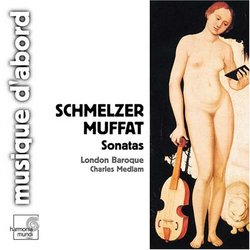| All Artists: Johann Heinrich Schmelzer, Georg Muffat, Charles Medlam, London Baroque Title: Schmelzer, Muffat: Sonatas Members Wishing: 0 Total Copies: 0 Label: Harmonia Mundi Fr. Release Date: 5/10/2005 Album Type: Import Genre: Classical Styles: Chamber Music, Historical Periods, Baroque (c.1600-1750), Classical (c.1770-1830), Instruments, Strings Number of Discs: 1 SwapaCD Credits: 1 UPC: 794881765829 |
Search - Johann Heinrich Schmelzer, Georg Muffat, Charles Medlam :: Schmelzer, Muffat: Sonatas
 | Johann Heinrich Schmelzer, Georg Muffat, Charles Medlam Schmelzer, Muffat: Sonatas Genre: Classical |
Larger Image |
CD Details |
CD ReviewsSuperior performances by Medlam &Co and a rapturous Passacag Ruminator | The Fencepost | 10/06/2005 (5 out of 5 stars) "The classical recording industry has enjoyed a Golden Age of early and baroque music performance since the premature tragic death of David Munrow. This movement has been especially favorable to composers from the early baroque such as Corelli, Biber, Muffat, and Schmelzer, who all pioneered the violin sonata in the late 17th century, and has nurturerd a growing roster of performers and ensembles on period instruments. London Baroque pioneered this practice to the high level of refinement that is standard today, and I believe this CD may be their finest achievement on record. Another strong candidate would be their Charpentier recording, unfortunately NLA, but perhaps it will also be reissued someday at bargain price.
Dozens of recordings of early baroque violin sonatas by composers such as those mentioned above have been issued over the last 20 years, by performers with illustrious names such as Manze, Huggett, Goebel, and Biondi. However few of them stand as high as this magnificent recording from 1986. Rather than pursue the weary path of completeness, London Baroque selects some of the best work of these two composers and produces a set of performances that exhibit a rare blend of professional commitment, dedication to musical objectives, and personal enthusiasm. Progressing more or less chronologically, we first enjoy the many varieties of expression typical of Schmelzer's sonatas, from the lachrymose Lament for Ferdinand to the bustling recreation at a Fencing School. Anybody familiar with the rapid alternations of mood and tempo associated with Biber's sonatas (e.g., his Battalia) will find that Schmelzer was an innovator of this dramatic style. After 5 wonderful Schmelzer sonatas we come to Muffat's Sonata #5 from Armonico Tributo 1682 and its concluding Passacaglia. This is truly The Bomb in Muffat's ouevre, and I know of nothing like it by any other composer, although it clearly owes a lot to Corelli. London Baroque sets this piece and performance apart from all others, with Seifert and Gwilt entwining rapturously for 10 minutes over the firm tread of Medlam's walking bass. It sounds like they practiced until they got it perfect, and their inspiration is unmistakable. Comparisons with other versions by Goodman, Banchini, Duftschmid or even the great Kuijken will attest to the superiority of this one. To prevent confusion, let me mention that Muffat's Passacaglia is the original version of the Chaconne from Propitia Sydera 1701 - Muffat recycled some of the earlier sonatas for his later collection of concertos. The complete 1701 collection may be of interest to some, and I recommend that they investigate Peter Zajicek's account on Naxos with Musica Aeterna Bratislava. But this CD will be essential for most listeners, providing hours of satisfaction for years to come. The only downside is you may not be able to get that Passacaglia out of your head!" |
